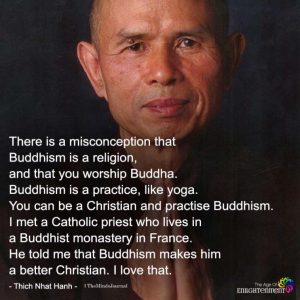 Groups often want to claim that their practices and beliefs constitute a religion. The label religion provides certain benefits, such as a protected legal status, respect in certain contexts, and often prestige. In fact, various groups like Sikhs and Jains want to see their religions included in the discussion of World Religions for the legitimacy that it affords. The image above circulating on social media lately identifies Thich Nhat Hanh, a Vietnamese Zen monk, as making the opposite assertion, that Buddhism is not a religion.
Groups often want to claim that their practices and beliefs constitute a religion. The label religion provides certain benefits, such as a protected legal status, respect in certain contexts, and often prestige. In fact, various groups like Sikhs and Jains want to see their religions included in the discussion of World Religions for the legitimacy that it affords. The image above circulating on social media lately identifies Thich Nhat Hanh, a Vietnamese Zen monk, as making the opposite assertion, that Buddhism is not a religion.
A rejection of the label religion can have a variety of motives. In some legal contexts in the United States, with the Establishment Clause in the First Amendment of the U.S Constitution, groups assert that something is not religious so that it can remain as a part of government-sponsored practice, such as a public nativity scene or an opening prayer. The rejection of the label religion in this quote, however, hinges on a particular definition of religion, the assumption that religions must be exclusive commitments. If Buddhism is a religion, then people who identify as Christian or Jewish cannot / should not practice it. But since it is merely a practice, it does not contradict identifying with another religion.
That assertion is not unique to this quote. In India, I met several people who identified as Hindu and used this type of language for Sufism, what is commonly described as mystical Islam. One of these individuals argued that Sufism is really about loving God, and thus anyone who loves God can be a Sufi. Then he proceeded to identify as a “Sufi in a sanatan way,” referring to one label for Hinduism as Sanatan Dharm (Eternal Tradition / Religion).
One interesting aspect of both of these assertions is that many in various parts of Asia do not assume that a person should have an exclusive commitment to the religion with which they identify. It is common for people who identify as Hindu, Jain, Muslim, Sikh, or Christian in India to participate in practices that people commonly identify with any of these other religions, without assuming a threat exists to their identification. Similarly, in China many people and temples incorporate figures associated with Daoism, Buddhism, Confucianism, and folk religion into their practices without creating a problem, and many do not hold to a singular religious identification at all.
So why these denials of religious status? In both the comments about Sufi and Hindu to me and in the quote attributed to Thich Nhat Hanh, I suspect that the identification of the audience with Europe and/or North America is an operative issue, since assumptions that a religious identification should be exclusive of any other religion’s practice dominates those cultures. The French Catholic example in the second part of the Buddhism quote suggests that the quote is directed towards a European and/or Christian audience, reassuring them that participation in Buddhist practices does not threaten their Christian identification.
Unpacking such dynamics is one aspect of what we do in the Department of Religious Studies, teaching students to recognize the various ways people employ classifications like religion or Buddhism. The classification is not simply tied to a trait inherent in the object being classified, so we are not trying to determine what is really religious and what isn’t. The classification reflects the purpose of the person presenting the classification, just as I will use this quote to present the complexity of Buddhism in my course this Fall.